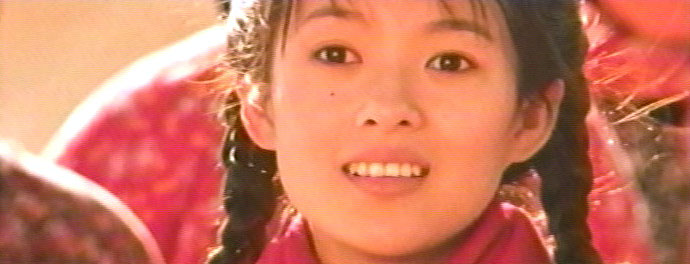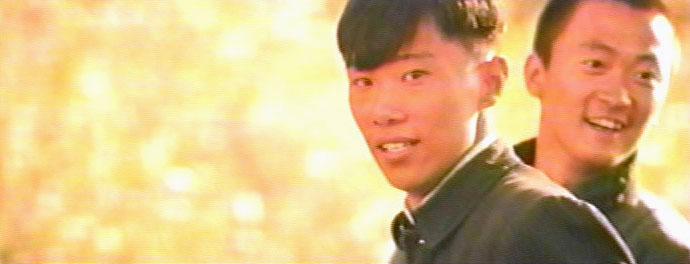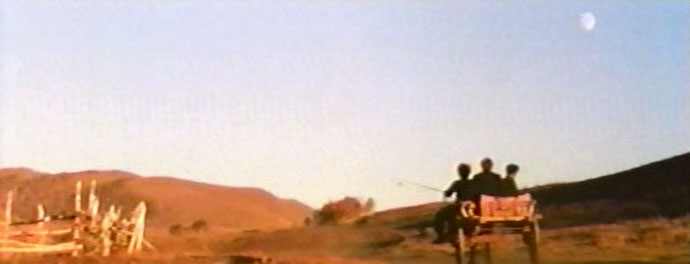| Review of Zhang Yi Mou¡¦s ¡§The Road Home¡¨ |
3rd Ferbruary 2001
|
|
I will declare my bias from the start: I am a HUGE fan of Zhang Yi Mou. He is a consummate filmmaker and, I suspect, a most interesting and compassionate human being. I would love to meet him, sit at his feet, listen to his wisdom. I can no longer remember which of his films I ever saw first, but I was hooked from that time on. His face is well known: As a young man, he was one of the actors in an early film called ¡§The Well.¡¨ He has become famous in his own right as a director, initially for his collaborations with the beautiful Gong Li in such films as ¡§Raise the Red Lantern.¡¨ Such earlier films are rather complex, almost lush in their visuals and story lines, usually classical themes set in pre-modern times. He has recently evolved away from that genre.
His two most recent films have elicited their share of criticism. Two years ago, in ¡§Not One Less,¡¨ ¡§Yi Ge Dou Bu Neng Shao,¡¨ he took the world inside a tiny, poor village in northern China to share the lives of a class of elementary school kids and their new teacher, a girl hardly older than themselves. The story is about her quest for a student who goes missing in the big city. It becomes a classic night journey of her self-discovery and maturation that ends in the kind of triumph that matter most in life. It left me sitting in the theater sobbing at the end for the humane vision that Zhang Yi Mou brought to people whom the world would never otherwise see, let alone care about. It is a deceptively simple movie with no hi-tech visual effects that I could discover, a character-driven story richly told, photographed, and edited. We learned from the credits that many of the ¡§actors¡¨ in the film were actually real-life residents of the village where it was filmed. But some criticized the film as showing the ¡§bad side¡¨ of China to the world. They criticized Zhang Yi Mou for his new style of moviemaking, abandoning the classical forms and stories for modern tales of ¡§insignificant¡¨ people. They wanted grandeur and scope and good endings costumes and¡Xpropaganda. In ¡§The Road Home,¡¨ the Chinese title of which is ¡§My Father, My Mother,¡¨ ¡§Wo De Fu Qin, Wo De Mu Qin,¡¨ Zhang has refined his mature technique even more. The story begins with a visit by an adult son from the city to his aged mother in his home village. She tells him that she wants him to help her prepare to bring his father¡¦s body home to the village in a coffin as per the ancestral custom. She then proceeds, in flashback, to narrate the story of her youth, of the handsome young teacher with whom she fell in love, and a bit about his work with his students in the village' s one school. At the end, they do make the funeral procession along the road home, hence the title, with the teacher¡¦s now-grown students competing with each other for the honor of being one of the pallbearers in a driving snowstorm.
But in-between there is no narration. We do not actually see the young couple get married. We do not see inside the teacher¡¦s classroom. We do not see any of their married life or the birth of this son who is now grown. We never see the husband and father as an old man¡Xonly as a shining youth, and then only in short bytes of film that reveal precious little about him. This is a daring step for Zhang, leaving out this much of the flashback, but ultimately it is crucial that we care immensely about the dead man, and that we understand thoroughly why the villagers love him so. That Zhang accomplishes the task of making us do just that is an immense tribute to his immense talent as a storyteller. The visuals of this film are stunning¡Xthe seasons, the countryside, the ¡§road¡¨ itself, the weather, the food, the pottery, the characters. The cinematography (on location in He Bei) and editing are breathtaking¡Xlike the best of David Lean and Robert Wise. There is both glorious summer and bleak winter here, in the image of life itself. I doubt I will ever forget the old man who trundles through the village, tools of his trade slung over his shoulders, announcing that he mends broken pottery, or the way in which Zhang shows us, in extreme close-ups, just how that is done. The actor who plays the old man (or maybe the old man himself) hardly moves a muscle, hardly says more than a single mouthful of words. ¡§You know, I charge for the nails,¡¨ he says. ¡§It will be more expensive than buying a new bowl.¡¨ Yet his presence on the screen and in the story is absolutely riveting. It reminded me of John Hurt¡¦s brilliant and tightly controlled performance in like manner in the American movie, ¡§Midnight Express¡¨ many years ago. Likewise the blind mother of the girl, who sees worlds without her eyes. Or the mayor of the village. Or the grown son himself, who starts out as a city geek, then grows into a new stature as he reconnects with his roots. Or especially the aged mother who is the narrator. She hardly moves a muscle, either, but she is absolutely convincing. So is the young actress who plays her as a teenager. Usually, these kinds of dualities don¡¦t work in films¡Xa young actor and an old actor purportedly playing the same person years apart. But the match between these two is seamless. This film is a tribute to actors and acting¡XI guess. Or, it¡¦s a tribute to the kind of performances that Zhang Yi Mou can get out of ordinary people who aren¡¦t usually actors but become so in his hands. Whoever they are, I utterly believed them and was transported to that day and time in China¡¦s heartland. And when it was over, I had re-examined the old questions: What is life? What is death? The questions Ridley Scott had Roy Batty (Rutger Hauer) explore so poignantly in ¡§Blade Runner.¡¨ Run, do not walk, to see ¡§The Road Home.¡¨ If you haven¡¦t been in love, or haven¡¦t been in love for a long time, or if you aren¡¦t in love now, or if you don¡¦t remember what love is, go to see this movie. It will renew your faith in mankind. Today there are a lot of lost movies that are full of despair, ugliness, profanity, and sickness. A lot of writers and filmmakers have forgotten William Faulkner. He taught us that it is the writer¡¦s duty to remind man of his glory, pride, suffering, and sacrifice¡Xto write not of the glands but of the heart; to lift him up and remind him of the great things of life: Pity, honor, hope, love. Faulkner said: ¡§I believe that man will not merely endure; he will prevail.¡¨ You can read online his eloquent Nobel Prize acceptance speech, in which he makes these statements, at: http://www.lehigh.edu/~jcf2/faulk~1.html. The critics of Zhang Yi Mou are surely wrong. Professionals around the world have awarded virtually all of his films with film-festival accolades and printed tributes. Like his counterparts such as Chen Kai Ge and Ang Li, he is finding things within the Chinese soul that are universal and important and¡Xwhat is perhaps the best part¡Xtranslating them for all the world to see in a filmic vision that will melt your heart. Bob |
|
Road Home (c) 2000 Sony Pictures Classics |


